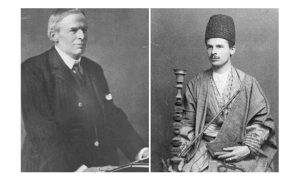During several years when Edward Browne went around Iran, he wrote about various Iranian nations. His writings are along with hatred up and down and sometimes are along with sympathy. Hujjatul Islam Seyyed majid Pour Tabatabasee, the member of the scientific council of Quranic sciences of the center for Quranic culture and knowledge Qom city has nearly studied all Edward Browne’s books and is going to print a book entitled “Orientalism based on searching the holy Quran.” He has known Edward Brown out of his books and believes that Edward Browne was commissioned to preach and proselytize for Bahaism. Here is an interview with him:

– Is Edward Browne a writer or an orientalist?
At the moment, I am working on an epistle or a book called “Orientalism based on searching on the holy Quran”. The first part of this research is about the plan of confrontation of the orientalists with the holy Quran. In this chapter, we have investigated the orientalists’ services and betrayals.
The orientalists’ betrayals are being classified into three categories:
I) Supporting the Jewish,
II) Preaching Bahaism,
III) Stealing the handwritten copies of Islam.
Edward Browne has played rode in preaching Bahaism.
– Before investigating the role of Edward Browne in preaching Bahaism, explain about Browne’s entrance in Iran?
Arthur de Gobineau was the French minister plenipotentiary in Iran. During this period of time, he studies in various fields. So, he writes a book called religions and philosophy in the Middle Asia in French language. This book has been published eight times since 1860 to 1900 A.D. due to the importance of studying Islam in Europe. Everybody who wants to study about Islam after Grobineau obliges him/herself to study this book. Most of the book is about Babism and Bahaism. Edward Brown sees this book and is influenced by it. He enters into Iran and stays in Tabriz city (Azerbaijan) and writes the book called “A year among the Iranian people”.
– Edward Browne’s speech concerning his aim to travel to Iran is contradictory. He introduces himself to be fond of Iran in one place and comes to Iran to visit Shiraz (Fars) and in another place, he considers his trip to be influenced by Gobineau’s book. Explain about these contradictions?
Yes, Those who have investigated this issue and have studied Browne’s writings know that he himself has said he has come to Iran to visit various regions and he has written in another book that: ” I read Gubineau’s book. when I figure out that he has investigated Basism and Bahaism, I came to Iran to pursue Gobineau’s works on Babis and Baha’is.” Muhammad Taghi Qazvini writes about Browne’s books about Bahaism: “Master Browne’s compilations regarding Babism is the continuation of Gobineau’s deffective researches; so that he revealed the first 70-year events of this new creed since its emergence in 1260 A.H. till 1330 A.H. and opened a new chapter in history. It is obvious from the statements and words that Mohammad Taghi Qazvini himself believed in Bahaism because he acknowledges Edward Browne’s attempts. Other translators and researchers commemorates Browne, so. e.g.: Mojtaba Minavi.
Yes, Mojtaba Minavi says about Bahaism in one place: “After traveling to Iran, Browne has searched about the Iranian religion for several years and has written some books and articles concerning Ismaeelieh Horoufieh, Sheikhism and Paeeyeh.
Qazvini and Minavi are writers who are Edward Browne’s benchmen in belief.
– Give some examples of Edward Browne’s intellectual and religious tendencies?
Browne attacks the great scholar Majlesi extremely and criticizes his works. I don’t know what the reason is exactly, but the gist of the matter was that during the great scholar Majlesi’s period of time, the extremist movements of Sufism wanted to endanger the basis of Shia school. So, the great scholar Majlesi wrote a series of “Shia beliefs” books in Persian language in this regard and stated Sufism nullity using documents. The influence of these writings and documents were so strong and extensive that even Edward Browne always had biased views towards Majlesi and he was continually criticizing him.
Contrary to Minavi, Qazvini and Hassan Zadeh who admired Edward Browne, late Anjawi Shirazi wrote an article in Negin magazine in 1354 S.H. answered Browne. Anjawi wrote in that article: “Edward Browne is a famous orientalist and so-called writer of whose Satanic interior people are unaware. He reveals Edward Browne’s attempts to preach Baha’ism and his sectarian activities and articles.
– What are Edward Browne’s books about Baha’ism cult?
The translation of Sayyah article compiled by Abbas Effendi known as Abdul Baha in 1892 A.D., the translation of “the new history” of Ali Muhammad Bab compiled by Mirza Hussein Hamadani 1883 A.D., publication of “Sabah article”, publication of the text “Naqtatul Kaff” written by Hajj Mirza Jani Kashani in the Asian Kingdom Assembly magazine, some memoirs about the riot of Babis in Zanjan in 1850 A.D. and etc. are of the activities of Edward Browne in the field of Babism and Bahaism cults. Of course, in other books written by Edward Browne such as “a year among by the Iranian”, Babis and Baha’is have been paid attention and their murder was pretended to be done in an oppressed manner. In this book, he has written about the adventure of Ali Muhammad Bab’s arrest and his execution. He concludes page by page that those executions were quite wrong.
– Why doesn’t Edward Browne pay attention to various cults in the debate of religions and cults and doesn’t regulate the numbers of followers of religions?
It seems the has ignored the Christians who were comfortably living in Iran. There is a discussion like this in the analysis of the book religions and philosophy in the Middle Asia by Gobeanu. Like Edward Browne, Gobeanu expresses to be impartial, but he emphasizes on Babism and Bahaism cults. Browne has also continued his job. He has travelled to Acre several times and translated, edited and printed 10 to 12 books. He takes handwritten copies to London. He goes to Acre and various cities to search about these cults, but it isn’t clear it is so or not. If a researcher investigates Browne’s 12 speech and writings, he/she will surely look upon him as an exact and definite agent whose main aim is to strengthen Babism and Bahaism.
– So, why are there differences of ideas among the opponents and those who agree with him?
He introduces himself as a sympathetic person who wants to help the Iranian culture and literature, while his aid is cover for his main mission.
Mr. Shafiee Kad Kani has written in the introduction of the book “Sufism” written by Nicholson: “If an orientalist says the yogurt is white; I think, he/she will want to take yogurt’s whiteness out of it. Or he/she is going to stabilize blackness.






